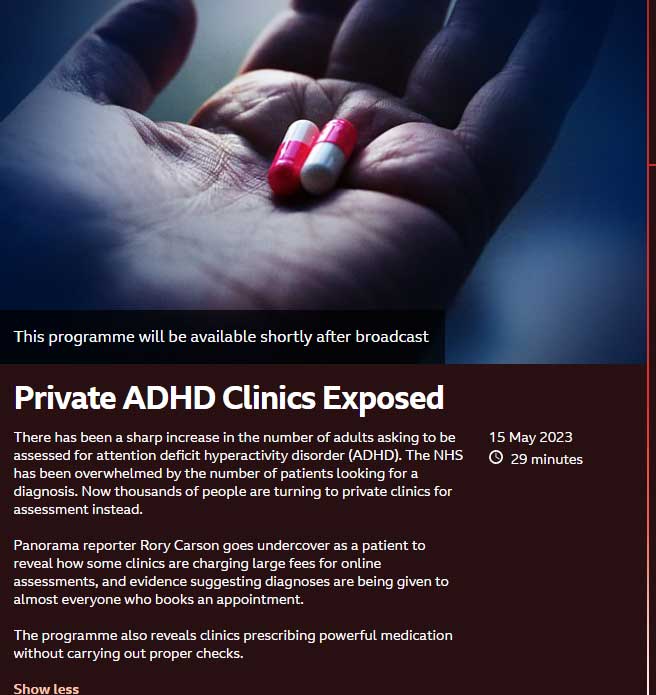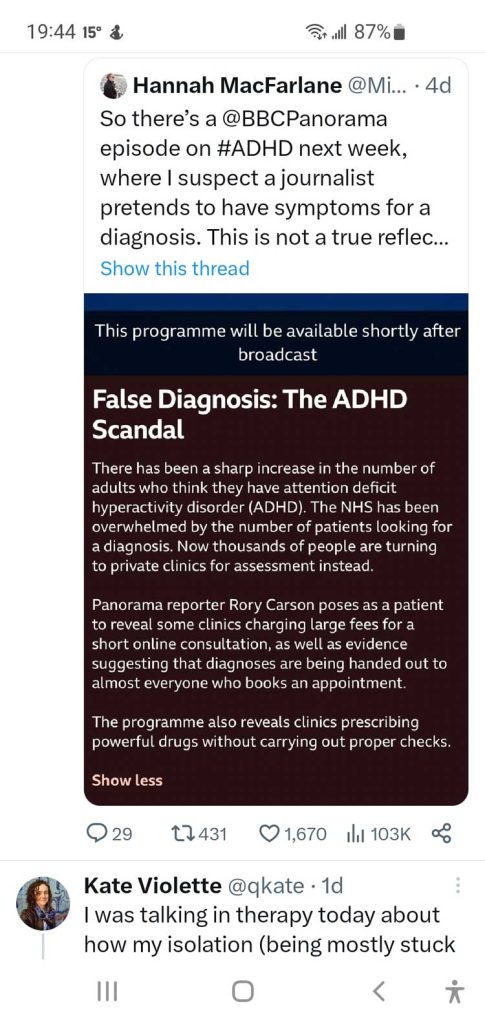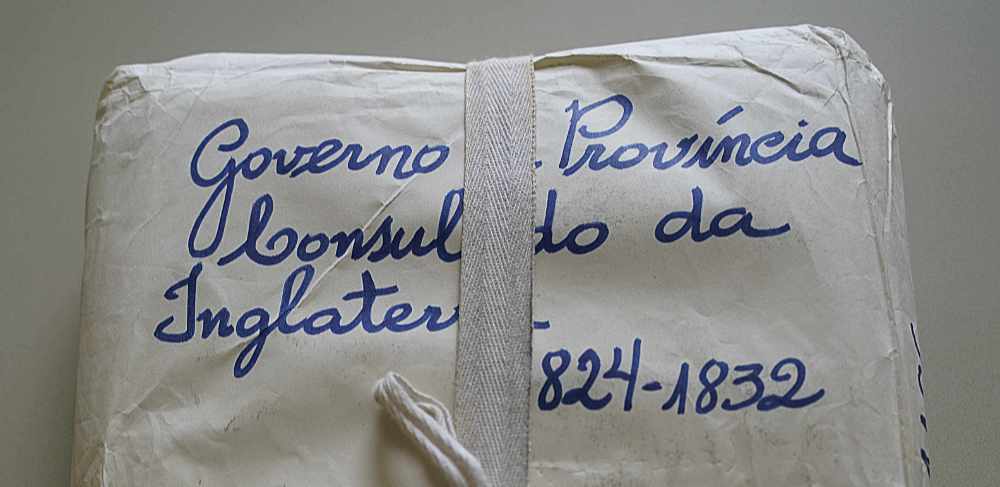
BBC Panoroma uses “ADHD Face” in what appears to be a second apparently unethical and disgraceful “investigation”
UPDATE THREE 1531 Pacific Time May 15, 2023
The UK ADHD Foundation has issued a statement
Response to BBC Panorama “Private ADHD Clinics Exposed”
As I suspected, Panorama failed to reach out the ADHD community groups in the UK. This is a major failure of journalistic ethics:
Whilst we welcome responsible and informed television journalism, any reporting that does not engage with patient led groups will inevitably be a cause of concern to us. We question the impartiality of this programme as The ADHD Foundation Neurodiversity Charity and other NGOs have been left out of the conversation and research.
The foundation says it reached out to Panorama after the initial publicity but was apparently ignored
We contacted the reporting team on May 4th, 11 days before the programme was to be broadcast, to explain points of concern so they understood the context of why so many people cannot access health care from the NHS and must resort to private providers. It took until the afternoon of May 12th for them to respond to our concerns, which do not appear to have been considered in the programme.
Concluding
We are disappointed that BBC Panorama has opted to broadcast a poorly researched, sensationalist piece of television journalism. This programme has focussed on a niche issue whilst completely ignoring the broader context, including why there has been a rapid growth in private providers.
Read the entire statement at the link above.
UPDATE TWO 1432 May 15, 2023
The reaction from those people on Twitter in the UK with ADHD/ADD who have now watched the program is overwhelmingly angry up to outrage.
(Unfortunately none are using a thread compiler or link to a site so so far I cannot post them)
There is clearly a serious flaw in the story. While Rory Carson “pretended” to have ADHD with the clinics, when he met with the National Health Service for an interview cum diagnosis that was all set up beforehand–in other words the request for an interview was vetted by the NHS PR department. That is not story balance; that is comparing wild salmon with farmed salmon.
As a journalist, I find Carson’s explanation insulting and arrogant. “repeatedly states that he believes he was showing some signs of the condition when he decided to be professionally assessed for ADHD.”
The NHS assessment even if it was on camera, showed that he did not have ADHD. That means he didn’t have the lived experience of myself and other journalists (and writers) with the condition, including mysterious failures and f**k ups at work that seem to come out of no where. From his Linked Iin profile it doesn’t appear that his career reflects the mess ups and even melt downs (and occasional successes) that all journalists with real ADD/ADHD experince.
The problem is getting worse because most of the media in the UK are simply rewriting and parroting the Panorama findings, again without reaching out to any ADD/ADHD journalists in their own ranks or the ADD/ADHD community organizations in the UK.
My original headline stands the story is unethical and disgraceful.
Only one story I checked online reflects the community anger and disappointment.
Huff Post
BBC’s ADHD Documentary Has Raised A Lot Of Eyebrows – And Not About The Clinics
by Kate Nicholson
I hope that those media outlets in the UK with some integrity remaining will do better second day stories.
UPDATE One early morning Pacific Time
The BBC has now posted an excerpt and web version of the story for those outside the UK.
The web version doesn’t appear to be as bad as the early impressions feared.
No one can be adequately diagnosed with ADHD over one short hour long Zoom call. Charging the equivalent of $1000 to $3000 CAD is a ripoff worth exposing as was the lawyers’ threats to those who posted bad reviews.
My main point is this: A journalist actually with ADHD could have honestly described his/her/their symptoms without having to lie and the resulting story would still expose the clinics and make the point even stronger.
However, the approach and focus of the story, without sensitivity to the overall ADHD community and the apparent lack of participation in the item by journalists who have ADD and are open about it is still not in keeping with journalistic standards in 2023.
Original story
To be a journalist with undiagnosed Attention Deficit (Hyoperactitity) Disorder is, far too often, to have a career too often is a series of mistakes and failures interspersed with occasional moments of brilliance and perception and only that latter that save that career from being a total disaster.
I spent the first twenty-five years in journalism, in print, radio, television and online, most of it at the Canadian Broadcasting Corporation, too often wondering what the frig had gone wrong time and time again.
It was one Saturday morning in the fall 1998, reading a newspaper containing a review of a new book on ADD, something I had never heard of, that was a moment of epiphany. As soon as I finished breakfast I jumped up on the Toronto subway to the nearest bookstore and read the book that afternoon.
I called my family doctor and saw her the following week. Luckily she had a friend from medical school who had a pediatric ADD practice who had begun treating adults (since ADD/ADHD is likely genetic parents are often treated alongside their children) and began the usual tests.
The diagnosis was confirmed and I was put on meditation that steadied my brain and likely rebooted my career. Others have not been so lucky, and have seen their hopes, dreams and careers go down in firing flames.
To be an ADHD/ADD journalist is to be in the closet, being open about it could be career destroying. Now that I am semi-retired I have no need to keep that secret, as some journalists I know still keep their condition and life secret.
So this evening I came across a growing Twitter storm over an upcoming episode of BBC Panorama to air on Monday. (That means like everyone else I haven’t seen the episode and probably won’t see it since it is geoblocked)

This this how the BBC describes the episode
There has been a sharp increase in the number of adults asking to be assessed for attention deficit hyperactivity disorder (ADHD). The NHS has been overwhelmed by the number of patients looking for a diagnosis. Now thousands of people are turning to private clinics for assessment instead.
Panorama reporter Rory Carson goes undercover as a patient to reveal how some clinics are charging large fees for online assessments, and evidence suggesting diagnoses are being given to almost everyone who books an appointment.
The programme also reveals clinics prescribing powerful medication without carrying out proper checks.
Now those of us in the ADD/ADHD community know that there are clinics, not just in the United Kingdom, that exploit an ADD/ADHD diagnosis. Worse is the unwarranted medication of some children without ADD in some schools in some locations just to keep them in order.
The real story, as the anger on Twitter from people in the UK who are struggling for diagnosis and treatment shows; they are are waiting months, even years for diagnosis and treatment in the failing National Health Service.
That lack of access to proper diagnosis, treatment, medication and counselling is a problem here in Canada where it is often not fully covered by provincial health plans and even care for those who have extended insurance, diagnosis and treatment is not always available or fully affordable.
The situation is often worse in the United States with its health care system, especially for marginalized communities.
The BBC had initially called the episode the ADHD Scandal, but after protests following the initial publicity changed the title to Private ADHD Clinics Exposed.
Changing the title is not enough. The entire premise of the episode where a reporter, Rory Carson, who one may presume doesn’t have ADHD goes undercover to get a false diagnosis, by it appears, giving a practitioner false symptoms, is a complete breach of contemporary journalistic ethics.
When I worked at CBC News, that kind of undercover operation was always approved by the highest levels of news management, so if there are similar policies at the BBC, then the blame for this goes to the top.
Let’s call it what is ADHD Face.
Why in 2023, would a prestigious show like Panorama even think of doing something so unethical and outrageous? Would the producers of Panorama or elsewhere in the BBC do something similar with any other marginalized community? It’s likely that those in Great Britain who can afford to attend and pay for access to private clinics are white and privileged. That, of course, ignores everyone else dependent on the NHS.
With the BBC under increased scrutiny in Great Britain, especially from the Conservatives who want to gut the service, what were Executive Producer Andrew Head and Producer Hannah O’Grady thinking when this idea was discussed and approved in a story meeting?
I am sure that in any organization as large as the BBC there are many reporters and producers who have ADHD. The question is how many are out of the ADHD closet?
In 2023, any reputable and ethical media operation does not send someone who knows nothing about a community to investigate that community.
It is crystal clear from this point of view, that if there are BBC staff open about an ADHD diagnosis they were not consulted or asked for advice. That kind of advice and consultation is now standard in any ethical journalism organizations, mostly with indigenous and communities of colour. It may be more difficult because ADHD is often hidden, but given Panorama’s dubious track record on covering ADD/ADHD, it should have been obvious that they should have reached out.
I did a quick Google search to see what other comments had been posted about this story only to find on the first Google page that Panorama had done a similar hatchet job on ADHD back in 2007, and the BBC Trust found the program was in breach of standards and was told in 2010 to issue an on air apology and withdraw the item
The Trust’s editorial standards committee (ESC) found that the programme, titled What Next for Craig?, failed to uphold the required standards for accuracy and impartiality.
Due to the “serious nature of the breaches”, a full correction and apology will have to be run at the start or finish of the next edition of Panorama on BBC One.The Trust also ruled that the episode must never be repeated on the BBC or sold to other broadcasters, while all mentions of it must be removed from the BBC website.
“The ESC expects the highest standards from Panorama as BBC One’s flagship current affairs programme, and this programme failed to reach those standards,” said the ruling.
“Due to the serious nature of the breaches the ESC will apologise to the complainant on behalf of the BBC and require the broadcast of a correction….
Panorama also “distorted some of the known facts in its presentation of the findings” and failed to acknowledge “a serious factual error”, said the Trust.
However, the ESC accepted that the makers “did not deliberately produce a programme that they knew to be inaccurate”.”
You would have thought after being hauled over the coals for “not deliberately” making a program that was such a disaster, that Panorama staff should have known better 13 years later.
So far there has been just one comment posted that I could find, posted just a couple of hours earlier, as the Twitter storm erupted. Private ADHD clinics saved me – their demonisation is devastating by Charlotte Columbo.
You can read it this for yourselves, but let me just add one key quote.
The original angle perpetuated the idea that the growing number of ADHD diagnoses were somehow “scandalous” suggests to me that the producers’ minds were made up about ADHD long before they conducted this investigation
The investigation purports to hold these “exploitative” clinics to account, pointing to a high number of diagnoses. The show’s description says that a reporter has gone undercover as a patient at these clinics, to show that “diagnoses are being handed out to almost everyone who books an appointment”. As someone who was diagnosed by a private ADHD clinic – someone who scrimped and saved for months because I was let down by the NHS – this is nothing short of devastating..
Panorama has definitely failed in one of the foundations of journalism, that while holding those who deserve it to account, ( and in the story the clinics do deserve to be held to account) do no harm to the victimized community.



